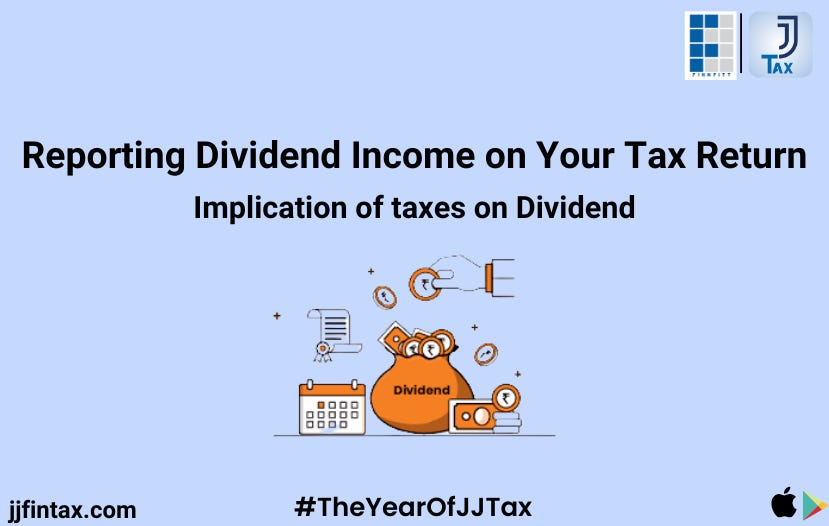Implication of taxes on Dividend✨

When you invest in stocks, mutual funds, or other dividend-paying assets, you become entitled to a portion of the profits generated by those investments. Dividends can be an attractive source of income for investors, providing both regular cash flow and potential capital appreciation.
Taxation of Dividends in India
As per the current tax regulations in India, dividends are subject to taxation under two main categories: Dividend Distribution Tax (DDT) and Individual Income Tax.
1️. Dividend Distribution Tax (DDT): Previously, companies were responsible for paying the DDT before distributing dividends to shareholders. However, effective April 1, 2020, the DDT was abolished, making dividends taxable in the hands of individual recipients.
2️. Individual Income Tax: Dividends received by individuals are now taxed as per their applicable income tax slab rates. It means that the rate of tax you pay on your dividends will depend on your total taxable income, taking into account dividends and other sources of income. It's important to note that dividends received up to INR 5,000 are exempt from tax in the hands of individual shareholders.
Reporting Dividends in your Tax Returns:
To ensure compliance with tax regulations, it's crucial to report your dividend income accurately in your annual income tax returns. Make sure to include the details of all dividends received during the financial year under the appropriate section, providing the necessary documentation and supporting evidence. Proper reporting will help you avoid any penalties or legal complications in the future.
To report dividend income in your tax return, you need to include the amount of dividend income you received during the financial year. If tax has been deducted at source (TDS) on your dividend income, you can claim credit for the TDS while filing your tax return.
Example:
Let's consider a hypothetical scenario where Mrs. Gupta receives dividends totaling INR 1,00,000 during the financial year 2022-2023. Suppose Mr. Gupta falls under the 30% tax slab rate for the financial year. In this case, his taxable dividend income would be calculated as follows:
Dividend Income: INR 1,00,000
Tax Rate: 30%
Tax Payable on Dividend Income: INR 1,00,000 × 30% = INR 30,000
Mr. Gupta would be liable to pay a tax of INR 30,000 on his dividend income.
Purpose of Form 15G/15H:
Form 15G and Form 15H are self-declaration forms provided by the Income Tax Department of India. These forms are primarily used to prevent tax deduction at source (TDS) on certain types of interest income when the individual's total income falls below the taxable limit. By submitting these forms to the respective financial institutions, individuals can avoid TDS deductions and ensure the availability of their full interest income.
Key Takeaways:
- Dividends received up to INR 5,000 are exempt from tax.
- Dividend income is subject to individual income tax slab rates.
- Form 15G & Form 15H help individuals avoid TDS deductions on interest income.
Bottom Line
At JJ Tax, we understand the importance of staying informed about taxation matters. Our team of experts is here to provide you with personalized guidance and support, ensuring that you make the most of your investments while staying compliant with tax regulations.
If you have any questions or need assistance with your tax planning or reporting, please don't hesitate to reach out to our dedicated team. We're here to help!

